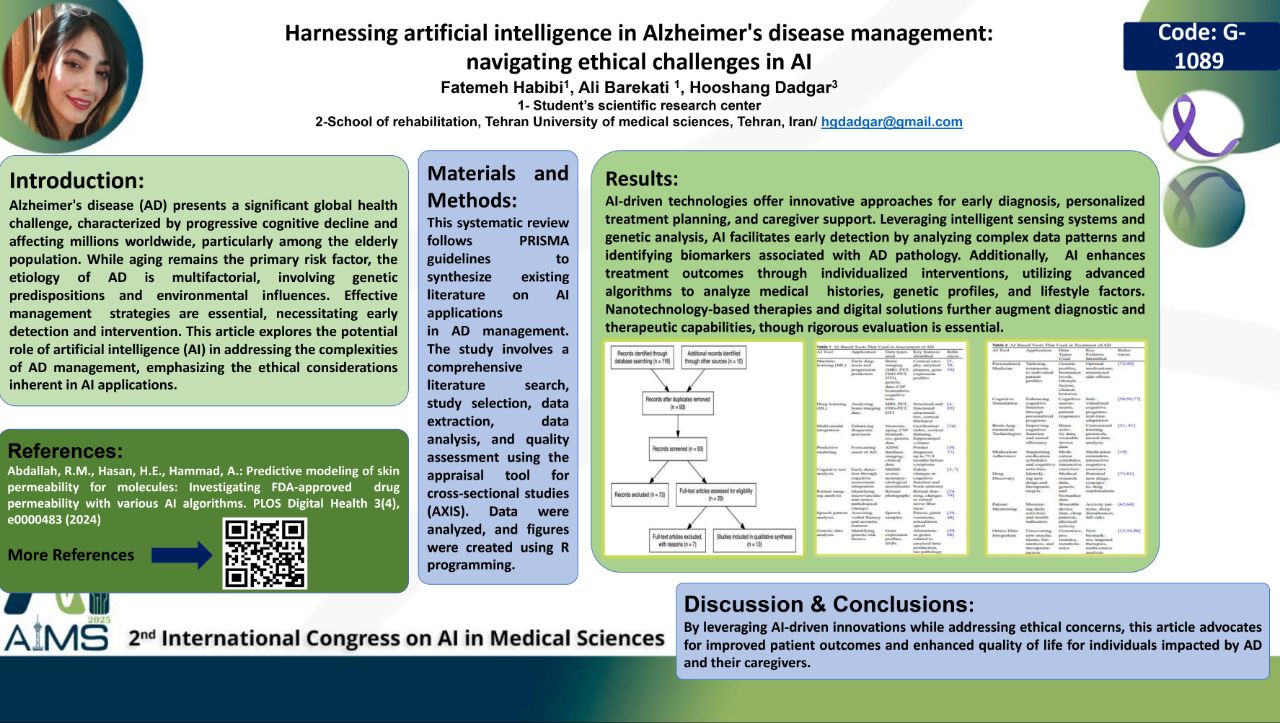استفاده از هوش مصنوعی در مدیریت بیماری آلزایمر: چالش های اخلاقی در هوش مصنوعی
کد: G-1089
نویسندگان: Fatemeh Habibi ℗, Ali Barekati , Hoshang Dadgar *
زمان بندی: زمان بندی نشده!
برچسب: دستیار مجازی هوشمند
دانلود: دانلود پوستر
خلاصه مقاله:
خلاصه مقاله
Background: Alzheimer's Disease (AD) presents a significant global health challenge, characterized by progressive cognitive decline and affecting millions worldwide, particularly among the elderly population. While aging remains the primary risk factor, the etiology of AD is multifactorial, involving genetic predispositions and environmental influences. Effective management strategies are essential, necessitating early detection and intervention. This article explores the potential role of Artificial Intelligence (AI) in addressing the complexities of AD management, emphasizing the ethical considerations inherent in AI applications. Method: This systematic review follows PRISMA guidelines to synthesize existing literature on AI applications in AD management. The study involves a comprehensive literature search, study selection, data extraction, data analysis, and quality assessment using the Appraisal tool for Cross-Sectional Studies (AXIS). Data were analyzed, and figures were created using R programming. Result: AI-driven technologies offer innovative approaches for early diagnosis, personalized treatment planning, and caregiver support. Leveraging intelligent sensing systems and genetic analysis, AI facilitates early detection by analyzing complex data patterns and identifying biomarkers associated with AD pathology. Additionally, AI enhances treatment outcomes through individualized interventions, utilizing advanced algorithms to analyze medical histories, genetic profiles, and lifestyle factors. Nanotechnology-based therapies and digital solutions further augment diagnostic and therapeutic capabilities, though rigorous evaluation is essential. Despite the promise of AI in AD management, ethical considerations such as algorithmic accuracy, data privacy, and the depersonalization of patient care must be addressed. Furthermore, the lack of standardized practices and regulatory guidelines presents challenges to the widespread implementation of AI technologies. Conclusion: Although AI shows promise in Alzheimer's Disease management, collaborative efforts among policymakers, regulators, and the biomedical community are crucial to ensure the responsible and ethical integration of AI in AD management. By leveraging AI-driven innovations while addressing ethical concerns, this article advocates for improved patient outcomes and enhanced quality of life for individuals impacted by AD and their caregivers.
کلمات کلیدی
AD, Artificial Intelligence, Dementia Care, Early
